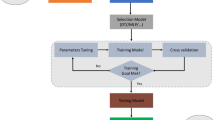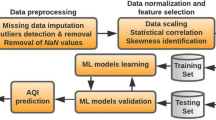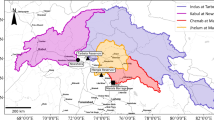Abstract
Urban flood inundation is worsening as the number of short-duration rainstorms increases, and it is difficult to accurately predict urban flood inundation over a long lead time; however, the traditional hydrodynamic-based urban flood models still have difficulty realizing real-time prediction. This study establishes a rapid forecasting model of urban flood inundation based on machine learning (ML) algorithms and a hydrodynamic-based urban flood model. The ML model is obtained by training the simulation results of the hydrodynamic model and rainfall characteristic parameters. Part of Fengxi New Town, China, was used to validate the forecasting model. A comparison of ML predictions and hydrodynamic model simulations shows that when using one ML algorithm (random forest (RF) or K-nearest neighbor (KNN)) for inundation prediction, the accuracy of the inundation water volume and area is insufficient, with a maximum error of 28.56%. Combining the RF and KNN models can effectively improve the prediction accuracy and overall stability, the mean relative errors of the inundation area and depth are less than 5%, and the mean relative errors of the inundation volume can control within 10%. The simulated time of a single rainfall event can be controlled within 20 s, which can provide sufficient lead time for emergency decision-making, thereby helping decision-makers to take more appropriate measures against inundation.













Similar content being viewed by others
References
Anupam S, Pani P (2020) Flood forecasting using a hybrid extreme learning machine-particle swarm optimization algorithm (ELM-PSO) model. Model Earth Syst Environ 6(1):341–347. https://doi.org/10.1007/s40808-019-00682-z
Bi X, Cheng L, Yao DS, Wang BP, Wang L, Jin LN, Yang XC (2015) Analysis on urban rainstorm pattern of Xi’an. J Anhui Agric Sci 43(35):295–297. https://doi.org/10.13989/j.cnki.0517-6611.2015.35.107
Breiman L (1984) Classification and regression trees. Wadsworth Int Group. https://doi.org/10.1002/widm.8
Breiman L (2001) Random forests. Mach Learna 45(1):5–32. https://doi.org/10.1023/A:1010933404324
Chang LC, Amin MZM, Yang SN, Chang FJ (2018) Building ANN-based regional multi-step-ahead flood inundation forecast models. Water 10(9):1283. https://doi.org/10.3390/w10091283
Chew AWZ, Law WK, Vu TT (2020) Optimizing speedup performance of computational hydrodynamic simulations with UPC programming model. J Comput Civ Eng 34(2):060200011–060200015. https://doi.org/10.1061/(ASCE)CP.1943-5487.0000876
Gao EP (2014) Research on manning coefficient of different vegetated slope. Dissertation, Beijing Forestry University
Guha-Sapir D, Hoyois P, Below R, Vanderveken A (2016) Annual Disaster Statistical Review 2015: The Numbers and Trends. CRED, Université Catholique de Louvain: Brussels, Belgium. https://doi.org/10.13140/RG.2.2.10378.88001
Ho TK (1998) The random subspace method for constructing decision forests. IEEE Trans Pattern Anal Mach Intell 20(8):832–844. https://doi.org/10.1109/34.709601
Hou P (2012) Pearson’s correlation coefficient. Bmj 345:e4483. https://doi.org/10.1136/bmj.e4483
Hou J, Liang Q, Simons F, Hinkelmann R (2013) A stable 2D unstructured shallow flow model for simulations of wetting and drying over rough terrains. Comput Fluids 82:132–147. https://doi.org/10.1016/j.compfluid.2013.04.015
Hou JM, Liang QH, Zhang HB, Hinkelmann R (2015a) An efficient unstructured MUSCL scheme for solving the 2D shallow water equations. Environ Model Softw 66:131–152. https://doi.org/10.1016/j.envsoft.2014.12.007
Hou JM, Guo KH, Wang Z, Jing HX, Li DL (2017) Numerical simulation of design storm pattern effects on urban flood inundation. Adv Water Sci 28(6):820–828. https://doi.org/10.14042/j.cnki.32.1309.2017.06.003
Hou JM, Li DL, Wang X, Guo KH, Tong Y, Ma Y (2019) Effects of initial conditions of LID measures on runoff control at residential community scale. Adv Water Sci 30(1):45–55. https://doi.org/10.14042/j.cnki.32.1309.2019.01.005
Hu X, Song L (2018) Hydrodynamic modeling of flash flood in mountain watersheds based on high-performance GPU computing. Nat Hazards 91(2):567–586. https://doi.org/10.1007/s11069-017-3141-7
Hu X, Shi L, Lin L, Magliulo V (2020) Improving surface roughness lengths estimation using machine learning algorithms. Agric For Meteorol. https://doi.org/10.1016/j.agrformet.2020.107956
Huang M, Lin R, Huang S, Xing T (2017) A novel approach for precipitation forecast via improved K-nearest neighbor algorithm. Adv Eng Inf 33:89–95. https://doi.org/10.1016/j.aei.2017.05.003
Hubbard ME (1999) Multidimensional slope limiters for MUSCL-type finite volume schemes on unstructured grids. J Comput Phys 155(1):54–74. https://doi.org/10.1006/jcph.1999.6329
Jhong YD, Chen CS, Lin HP, Chen ST (2018) Physical hybrid neural network model to forecast typhoon floods. Water 10(5):632. https://doi.org/10.3390/w10050632
Keller JM, Gray MR, Givens JA (1985) A fuzzy k-nearest neighbor algorithm. IEEE Trans Syst Man Cybern 4:580–585. https://doi.org/10.1109/TSMC.1985.6313426
Kwok SW, Carter C (1990) Multiple decision trees. Mach Intell Pattern Recogn 9:327–335. https://doi.org/10.1016/B978-0-444-88650-7.50030-5
Li GY (2017) Comparative study of soil infiltration under different land uses in loess hilly regions. Dissertation, Northwest A&F University
Li DL, Hou JM, Xia JQ, Tong Y, Yang D, Zhang DW, Gao XJ (2020) An efficient method for approximately simulating drainage capability for urban flood. Front Earth Sci. https://doi.org/10.3389/FEART.2020.00159
Liang Q, Xia X, Hou J (2016) Catchment-scale high-resolution flash flood simulation using the GPU-based technology. Proc Eng 154:975–981. https://doi.org/10.1016/j.proeng.2016.07.585
Liu C, Yin SQ, Zhang M, Zeng Y, Liu JY (2014) An improved grid search algorithm for parameters optimization on SVM. Appl Mech Mater 644:2216–2219.
Liu K, Li Z, Yao C, Chen J, Zhang K, Saifullah M (2016) Coupling the k-nearest neighbor procedure with the Kalman filter for real-time updating of the hydraulic model in flood forecasting. Int J Sedim Res 31(2):149–158. https://doi.org/10.1016/j.ijsrc.2016.02.002
Lu H, Ma X (2020) Hybrid decision tree-based machine learning models for short-term water quality prediction. Chemosphere 249:126169. https://doi.org/10.1016/j.chemosphere.2020.126169
Mekanik F, Imteaz MA, Gato-Trinidad S, Elmahdi A (2013) Multiple regression and artificial neural network for long-term rainfall forecasting using large scale climate modes. J Hydrol 503(503):11–21. https://doi.org/10.1016/j.jhydrol.2013.08.035
Quinlan JR (1986) Induction of decision trees. Mach Learn 1(1):81–106. https://doi.org/10.1023/A:102264320487
Quinlan JR (2014) C4. 5: Programs for machine learning. Elsevier.
Rocca ML, Miliani S, Prestininzi P (2020) Discrete Boltzmann numerical simulation of simplified urban flooding configurations caused by dam break. Front Earth Sci 8:346
Sivakumar P, Hyams DG, Taylor LK, Briley WR (2009) A primitive-variable riemann method for solution of the shallow water equations with wetting and drying. J Comput Phys 228(19):7452–7472. https://doi.org/10.1016/j.jcp.2009.07.002
Smith MW, Carrivick JL, Hooke J, Kirkby M (2014) Reconstructing flash flood magnitudes using ’structure-from-motion: a rapid assessment tool. J Hydrol 519:1914–1927. https://doi.org/10.1016/j.jhydrol.2014.09.078
Varoquaux G, Buitinck L, Louppe G, Grisel O, Mueller A (2015) Scikit-learn: machine learning without learning the machinery. GetMobile Mobile Comput Commun 19(1):29–33. https://doi.org/10.1145/2786984.2786995
Vialetto G, Noro M (2019) Enhancement of a short-term forecasting method based on clustering and knn: application to an industrial facility powered by a cogenerator. Energies 12(23):4407. https://doi.org/10.3390/en12234407
Wang H, Song L (2020) Water level prediction of rainwater pipe network using an SVM-based machine learning method. Int J Pattern Recognit Artif Intell 34(02):2051002. https://doi.org/10.1142/S0218001420510027
Wu F, Ramis R, Li Z (2018) A conservative MHD scheme on unstructured Lagrangian grids for Z-pinch hydrodynamic simulations. J Comput Phys 357:206–229. https://doi.org/10.1016/j.jcp.2017.12.014
Wu ZN, Shen YX, Wang HL, Wu MM (2020) Urban flood disaster risk evaluation based on ontology and Bayesian Network. J Hydrol 583:15. https://doi.org/10.1016/j.jhydrol.2020.124596
Xie K, Ozbay K, Zhu Y, Yang H (2017) Evacuation zone modeling under climate change: a data-driven method. J Infrastruct Syst 23(4):040170131–040170139. https://doi.org/10.1061/(ASCE)IS.1943-555X.0000369
Yin Z, Feng Q, Wen X, Deo RC, Yang L, Si J, He Z (2018) Design and evaluation of SVR, MARS and M5Tree models for 1, 2 and 3-day lead time forecasting of river flow data in a semiarid mountainous catchment. Stoch Env Res Risk Assess 32(9):2457–2476. https://doi.org/10.1007/s00477-018-1585-2
Yuan X, Chen C, Lei X, Yuan Y, Adnan RM (2018) Monthly runoff forecasting based on LSTM–ALO model. Stoch Env Res Risk Assess 32(8):2199–2212. https://doi.org/10.1007/s00477-018-1560-y
Zhu S, Luo X, Yuan X, Xu Z (2020) An improved long short-term memory network for streamflow forecasting in the upper Yangtze river. Stochastic Environ Res Risk Assess. https://doi.org/10.1007/s00477-020-01766-4
Acknowledgements
This research was supported by the National Key Research Program of China (2016YFC0402704), National Natural Science Foundation of China (52079106; 52009104), and the Shaanxi International Science and Technology Cooperation and Exchange Program (2017KW-014).
Author information
Authors and Affiliations
Corresponding author
Ethics declarations
Conflict of interest
The authors declare that they have no known competing financial interests or personal relationships that could have appeared to influence the work reported in this paper.
Additional information
Publisher's Note
Springer Nature remains neutral with regard to jurisdictional claims in published maps and institutional affiliations.
Rights and permissions
About this article
Cite this article
Hou, J., Zhou, N., Chen, G. et al. Rapid forecasting of urban flood inundation using multiple machine learning models. Nat Hazards 108, 2335–2356 (2021). https://doi.org/10.1007/s11069-021-04782-x
Received:
Accepted:
Published:
Issue Date:
DOI: https://doi.org/10.1007/s11069-021-04782-x




